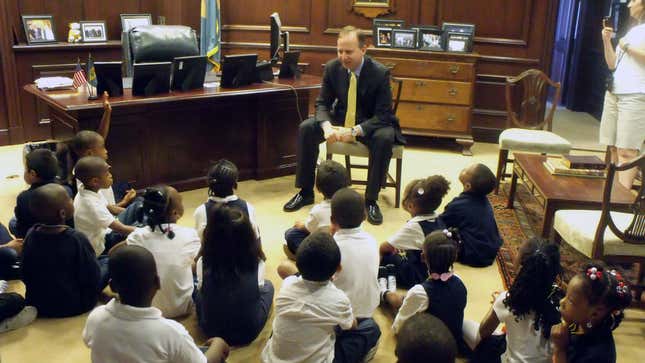
Companies know what US education and economic development policies often fail to reflect—that billions of potential customers do not speak English fluently. Unless we make world language education a greater priority, we may be costing our next generation of graduates some critical career opportunities and encouraging global companies with a strong American presence to hire outside of our borders.
Those are some of the reasons why hundreds of five- and six-year olds in Delaware public schools began immersion programs this fall in Mandarin Chinese and Spanish. While Delaware is probably not alone in thinking that the fight for our nation’s long-term economic future will be waged in part on tiny tables in kindergarten classrooms, we hope to be a place worth watching.
Students will learn their elementary math, science, and social studies in this second language. We estimate we will reach more than 10,000 students over the next 10 years—a good number for a state our size. For the thousands of students in these programs, full immersion will continue through fifth grade. In middle school, students will continue their study through honors language classes and will complete school projects with their peers in other countries.
By ninth grade, we expect every student in the program to be proficient enough that they can take and pass Advanced Placement (AP) language exams (beginning with Chinese or Spanish), after which they can continue their language study in a Delaware college or begin study of a second world language.
The program’s recent launch exhibited what’s best about our country—our creativity, adaptability, and sense of innovation. Many parents are so committed to giving their children a new opportunity to learn that there’s already a wait list in some districts. Local teachers have been so eager to learn from talented colleagues from around the world that many ended their summer vacations early to participate in the first annual Delaware Immersion Institute. In all, there has been a renewed sense of momentum at the kickoff.
Still, a small but angry number of Americans remain less interested in the path ahead and far more concerned with rehashing old debates. On the radio, in calls or posts in various social media—they’ve expressed a desire for things like “English Only” education. They paint with a broad “anti-other” brush any efforts to make sure our kids have greater exposure to the world economy in which they will be competing for jobs, and the multiple languages in which global commerce is conducted. Their arguments ignore the unfortunate fact that major U.S. companies created over 300,000 jobs overseas from 2009 to 2011, nearly three times as many jobs as those companies added in the U.S.
Ironically, the concept of “America first” these vocal few fervently embrace is exactly our goal: an American economy that is No. 1, in both opportunity for its citizens and output from its workforce.
Already, thousands of people in Delaware support their families by working locally at companies that are headquartered internationally. These include quality jobs at a Russian-owned steel mill, a German-backed research lab, banks based in western Europe and manufacturers from Asia. If we are successful, our schools will fully prepare graduates for jobs with these global companies, and our skilled workforce will lead US companies to base their job growth in Delaware.
To prepare our kids for the jobs of the future, we can’t keep doing things the way they’ve always been done. With initiatives like this, coupled with our statewide efforts to increase instructional rigor, educator support and accountability, we know our schools are on a path to serve our students differently. In the end, our obligation to our nation’s children is to ensure that they not only hear, but can understand, the phrase “you’re hired” in any language that a job is offered.